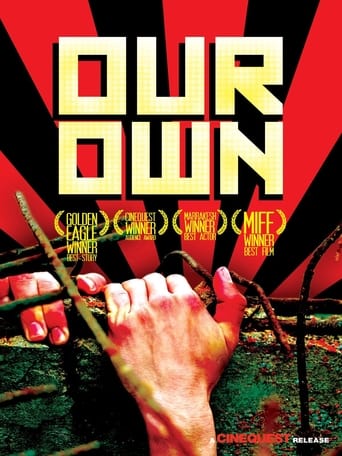mchenrykrm
As is typical of so many Russian made war films the acting and cinematography is outstanding and the depiction of Russian village life during the war is realistic,I tend to find the quality of these movies superior to what Hollywood puts out but then films of this nature might not click with the American public. The actors look like real people and the plots lack the melodrama and symbolism of too many American made films in general. Implying sex doesn't seem to be enough in the good old USA either but I think in this film it is handled quite well. We know what they are going to do and have done but rather than the overacted graphic stuff that appears to be required in US films, the act itself is left to the imagination. The plot centers on a group of three prisoners who escape the Germans during the first year of the German invasion. They hide out in a Russian village and struggle to survive in an area where the Germans are in control and friend or foe among peers is difficult to discern. From the Germans to the Russian village girls all of the actor's depictions are spot on. That's one of the things I love about these films.Extremely well done and to all involved in the film I say bravo!
.
Roger Burke
War is about a lot of things; mostly, though, it's about daily survival for those involved. That, essentially, is what this story is about and hence no different to other war stories.Being set somewhere in the Soviet Union of 1941, though, makes it different for non-Russians: the landscape is new, seemingly limitless, gray skies, barely inhabited, bleak in parts, lush forests in others, almost like another planet; and all filmed with de-saturated color that just makes it look all the more forbidding. Hence, against such a savage and unforgiving landscape, the trifles of the hapless and disparate trio of soldiers who arrive unannounced at a remote village seem hardly worth bothering about.The youngest of the three, however, knows more than the other two because this is his village, the place where he grew up and where his father is a local official who manages to tread the fine line between accommodating the demands of German occupation forces while also trying to help the three – particularly his son – to evade recapture. Needless to say, that's a dangerous game the old man plays and especially when he must also deal with the local police who are looking for the escaped soldiers.Add to that mix, there is the young local woman whom the son wishes to wed; and, to add to the old man's worries, the tough leader of the threesome falls in love with the old man's much younger wife. Such gratitude, indeed! The third soldier is physically sick much of the time, and is cared for by the old man and his woman; so, the sick one spends much of his time, coughing, moaning and lying in bed – and yet, he plays the most crucial role in the whole story towards the end.From one perspective, soldiers always want and need to survive; yet, from another, there is the basic human need to connect to another. It's that aspect which is explored and developed by the writer and director within a setting that is barely conducive to fighting, let alone staying alive. It's a tour de force in acting from actors I've not seen before.Productions standards are high: from the opening, gritty and horrific battle scenes to the pictures of typical domestic rural life – if not tranquility – within the Russian ark. Having been hugely entertained by Kukushka (2002) and The Return (2003), there is no doubt that only Russians are needed to make excellent Russian movies. This one is equally worth seeing.Not for children, of course, and highly recommended.
Lee Eisenberg
Dmitri Meskhiev's "Svoi" (which means "one's own") focuses on the moral dilemma of some Soviet soldiers during WWII. After they escape a POW camp, they end up on a farm. But this farm, while Russian, turns out to be not much different from anything operated by the Nazis. The character Nikolai, due to his manipulative actions, has more control over things than the Nazis do. To Starosta, the Chekist represents the 1930s repression in the USSR. As for why Starosta doesn't kill the man at the end...it's because the man is still one of his OWN (not a German).I certainly recommend this movie. Full comprehension of the plot does require some understanding of Soviet policy during WWII, namely that Stalin vowed to punish the family of any soldier who surrendered to the German army. But anyway, it's a really good movie.
betancur
I'm sure 'Svoi' (or whatever it is in English) is the best Russian movie of 2004. Actually i wasn't ready for the impression this film would make on me. 2004 was a great year for the Russian cinematography, we had a lot of good movies but this one seems to be not as commercial and blockbuster-like as many of them. Khabenskiy is becoming a real star cause he is in almost every film shot last year. He's everywhere but i like him and think that it makes him just better as an actor. The very beginning of 'Svoi' is a bit confusing because of shots with the soldier head smashing by the tank. By the way the film is really naturally made. I mean you should be ready for some shocking moments. The movie itself is good because of Stupka, Garmash & Khabenskiy's acting, fantastic music and unusual photography. Watch it and you'll see why it's so good, so Russian.


